Arts & Culture
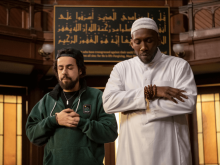
Ramy is a Hulu series wrestling with deep questions of faith from Muslim 20-something son of Egyptian immigrants. The show follows Ramy Hassan, played by comedian Ramy Youssef, as he navigates the tensions of dīn and dunyā — religion and the world. Transcending the clichés of blind religiosity, terrorist sympathies, and the social ignorance stereotypically associated with Arab and Muslim American life, Ramy shows us the messy work of finding our own way in the world between halal (permissible) and haram (not permissible).

Tár may be a 158-minute movie, but it starts rolling its credits at the beginning of the film. Not the usual type of opening credits, listing the names of movie stars and the director. Rather, Tár begins with what movie industry folks call “below-the-line” credits, showing the names of orchestra musicians and the various studio personnel. Most movies would save these credits for the end of the film, but Tár begins by listing every musician and laborer’s name, glowing white text on a black background.

EARLY IN THE 2022 NFL season, I watched as the Miami Dolphins quarterback Tua Tagovailoa suffered a second head injury in the span of five days. Although the NFL would not admit the first of those was a concussion, it was painfully clear that Tagovailoa suffered serious brain trauma.
In that moment, I felt the culmination of years’ worth of fretting over the sport I loved and its relationship to head injuries. I determined then and there on a Thursday night that I would quit the NFL. Why? The NFL is violent — and Christians are called to peace.
The league is unrepentant and unaccountable in its abuse of the brains and bodies of its players, and no amount of reform can change that. I am convicted that if I am to love my neighbors — if I am to love God — then I must resist the NFL.
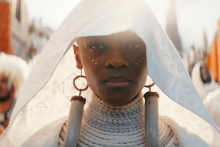
But it’s not the absence of Chadwick Boseman — whose death in 2020 is paralleled by T’Challa’s fate in the film — that makes the film fall short. Wakanda Forever suffers from the same ailment as much of the larger Marvel Cinematic Universe: It tries to offer individualistic answers to systemic evils. Unfortunately, there are evils in the world we can’t simply punch to death

I don’t often turn on a non-news network television show and expect to learn. Instead, I expect to laugh, maybe cry (I’m looking at you, This Is Us), see loads of inaccurate depictions of medical interventions, or simply be entertained. But ABC’s new primetime drama Alaska Daily has me expanding my perspective on the possibilities of network TV. And that’s thanks to the light it’s bringing to a dark truth: the crisis of missing and murdered Indigenous women.

DECEMBER IS A stressful time for fundraisers, as a significant percentage of most nonprofits’ annual revenue comes in during the holiday season. We made a mistake this month when we asked Beth, who does much of Sojourners’ online fundraising, to write a humor column for this issue. Instead of a humor column, she sent us the following, in an envelope with a return address of “a cave in the woods; do not look for me.” We hope she’s doing okay. — The Editors
Dear Potential Supporter,
Now more than ever. This holiday season. In this moment, this urgent time, the most crucial of moments that all of us are in, right now. (Yes, you too.) Now — today — more than ever — Sojourners needs your year-end donation.
Did you know that the average American hears the phrase “now more than ever” 500 times a day? Did you know that all other organizations who use the phrase “now more than ever” are copying us, and we used it first? (Did you know that I, a fundraising professional hiding inside a cave, am both deeply normal and a trustworthy source of information?)

My bones have been scraped
free of flesh, free of tendons,
muscles, veins—my heart is gone.
The marrow in my bones
is disappearing fast
and I am fragile,
dissolving into dust.
With a gust of wind
my cells could scatter.
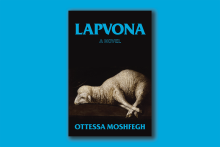
WHAT IS A devout village to believe in during a time of famine and plague? Ottessa Moshfegh presents a story devoid of hope and redemption in her latest novel Lapvona, proving that in dire times, believing is not a want but a need.
Moshfegh has a flare for brutality (Eileen and Death in Her Hands). With Lapvona, Moshfegh has crafted a medieval fantasy in the vein of Game of Thrones. It reads like a fairy-tale epic for adults, with its cast of fringe characters and fable-esque sequence of events. But this fantasy is far more depraved: As religious as the villagers are, there is no redemption to be found in this village.
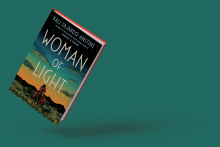
PRIMARILY SET IN 1930s Denver, Kali Fajardo-Anstine’s debut novel, Woman of Light, is a deeply immersive story about the survival and legacy of an Indigenous Chicano family. When a violent mob attacks him for having a relationship with a white woman, Diego Lopez flees the city, leaving his younger sister, Luz Lopez, with their aunt Maria Josie. But working as a laundress isn’t enough to keep a roof over their heads, so Luz gets a job as a typist for a local Greek lawyer. When a cop kills a Mexican factory worker, Luz’s boss David takes on the case, and Luz is exposed to the inner workings of an unjust system.
Epic in scope, the novel covers five generations. While we focus mainly on Luz and Diego’s timeline in the 1930s, we also get brief glimpses of the people who came before them. There is Desiderya Lopez, the Sleepy Prophet of Pardona Pueblo, who finds an abandoned newborn and raises him as her own. This child is Pidre Lopez, who later departs Pardona after Desiderya’s death. In the town of Animas, Pidre falls in love with the widow and sharpshooter Simodecea Salazar-Smith when he recruits her for his performing theater. Together, they run the vibrant business and raise their daughters Sara and Maria Josie until tragedy strikes with the arrival of white prospectors.
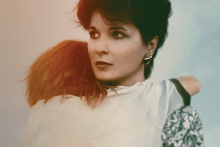
Children of the Underground
After seeing the courts return many children to allegedly abusive fathers, Faye Yager created an underground network that hid hundreds of mothers and children. The five-part docuseries Children of the Underground shows the moral complexity of Yager’s vigilante justice. Hulu/FX
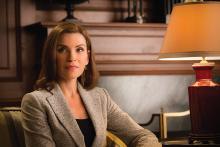
THE BEST WORD to describe The Good Wife (2009-2016) in comparison to its prestige TV peers may be generous. Its predecessors (The Sopranos, The Wire, Mad Men, Breaking Bad) in the TV golden age of the early 2000s set the expectation that serious dramas on the small screen have seasons of about 13 episodes each and air on platforms you must pay for (cable channels such as HBO and AMC, and now subscription streaming services like Netflix). In contrast, less-than-highbrow thrillers with a bit of humor, like the police procedural NCIS, pour out nearly double that amount of content per season on free network TV.
But The Good Wife on CBS defied that expectation. Here was a network drama that was just as revelatory about humanity as the best of cable’s offerings while also being hilarious, accessible, and plentiful (seven seasons of no fewer than 22 episodes each). In a world where complex female TV protagonists are still too rare, revisiting The Good Wife is a holiday break well spent.
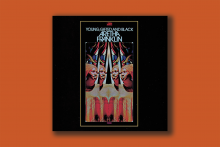
TOWARD THE END of the film documenting the performance of Aretha Franklin’s album Amazing Grace, the singer sits at a church piano. Like so many times in her childhood, she begins playing — gradually, almost tentatively — the opening chords to “Never Grow Old.” It was her first single, released when she was 14. As she sings of “a land where we’ll never grow old,” built by “Jesus on high,” folks in the audience — including gospel pioneer Clara Ward — cannot help but get up and dance. “Never, never never” — and then a Franklin trademark: mmm-mmm-mmm — “never grow old,” she testifies. You believe her.
This year, Aretha’s Amazing Grace turned 50. The album — recorded live at New Temple Missionary Baptist Church in Los Angeles with James Cleveland’s Southern California Community Choir and one of the greatest backing bands in all of pop music history — blends and crosses boundaries of genre, generation, race, and class. In 1972, Amazing Grace was not just a return to Aretha’s roots, but a vision of a future — one rooted in the Black experience in the U.S.
The liner notes credited Gene Paul as “assisting engineer.” Today, he is a legendary producer. Paul traces the genesis of Amazing Grace to Aretha’s 1972 record Young, Gifted and Black. That album’s title track, penned and first sung by Nina Simone, was a breakthrough in the civil rights and Black pride movements. “In the whole world you know / there’s a million boys and girls / who are young, gifted and Black,” the lyrics proclaim. While recording Young, Gifted and Black, Paul told Sojourners, Aretha began to conceptualize the live recording of a gospel album as a follow-up. When she thought of the potential project, Paul said, she “was smiling, captivated.” To Paul, there is a clear through line from Young, Gifted and Black to Amazing Grace: The former spoke to the contemporary Black political moment; the latter looked back in time while pulling her spiritual and cultural roots into the present. Both pointed the way to a Black future that was joyous and free.

The message of assimilation makes me uncomfortable because it requires me to celebrate the loss of other people’s culture, traditions, and languages in order to alleviate the fears that white people, including Christians, might have about a diverse society where their position as power brokers of society may be threatened. It is akin to saying, “White Christians, please do not fear immigrants because they, too, will submit to white supremacy and blend into it as best as they can, even with their non-white skin and features.”
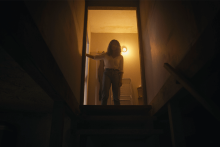
I’ve watched the recent horror films below with one (sometimes both) eye(s) closed, but also with a posture of curiosity and hope: What might my disturbed feelings reveal? May watching these films lead to, as author Brandon Grafius writes, “an openness to what the experience of horror might be able to teach us.”

There’s a kind of willful ignorance horror-averse Christians demand, because the truth is we don’t want to sit with the shadows or go down into the basement. We want to sweep all the ugly parts of life back under the bed where they might go bump in the night but won't trouble us in the light of day.

There are large swaths of the Bible that the lectionary skips over. And while there are lots of reasons for not including certain passages, it doesn’t take too long to notice one major pattern: Passages that are uncomfortably violent (or just angry) are frequently left on the cutting room floor, and consequently left out of Sunday worship.
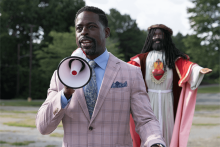
Honk for Jesus follows Lee-Curtis and his wife First Lady Trinitie Childs (Regina Hall) as they prepare a grand reopening for their Atlanta-area megachurch.

It’s silly to call trees people
saying firs waving limbs are yelling at wind,
and cedars so tall their tops disappear
have heads in the clouds,
or to sympathize with plants below
ripening berries, sending out seeds
on wings while struggling for scraps of light,
and then feeding survivors of fires.
Silly. Better listen. Memorial
services have their ways of bringing up
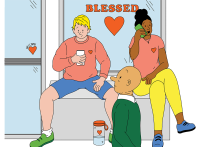
IT'S HARD TO tell whether Southern California, where I live, holds more nondenominational churches or neighborhood gyms. Sometimes, it’s even hard to tell whether a facility is a nondenominational church or a fitness center. At both the church and the gym, you are likely to encounter over-enthusiastic greeters in the foyer. And as you proceed farther into either type of institution, you’ll begin to hear vaguely inspiring pop-rock music. (Are the lyrics love songs to your boyfriend, to Jesus, or to an unrealistic projection of your future self? It’s hard to say — that’s the genius of it.) As you arrive in the back of these buildings, you’ll see a shared main attraction: a vivacious man in expensive sneakers urging you to strive for greatness, push through the pain, and please, please, please bring your friend with you next time. The websites of both the gyms and the churches will promise you a “no judgment zone” where “all are welcome.” Pretty good chance both are lying to you. But there’s free child care!
The biggest similarity of all between nondenom churches and neighborhood gyms? Their names: They will usually be one word long: Arise, Equinox, Crossroads. Likely, the names could also serve as code words for MDMA or WWE wrestlers’ stage names: The Rock, The Renegade, Saddleback.
Below are the names of gyms and churches. See if you can rise to the challenge, push through the pain, and determine which names belong to churches and which ones belong to gyms that I can’t afford.
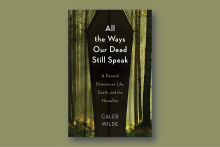
CALEB WILDE is familiar with death. He is the descendant of two long-term generational funeral home families and went into the funeral industry himself. His first book, Confessions of a Funeral Director, delved into some of the more uplifting stories he’s had in death care. His latest book, All the Ways Our Dead Still Speak, is more introspective.
The early chapters detail a few death experiences — an atheist seeing the dead parents of her husband as he dies, for instance — and at first, that’s what I thought the book would be about: exploring what people’s deathbed visions meant to them, regardless of whether those visions were real. But for Wilde, that’s missing the point. What matters is that the dead are still speaking to us. Death isn’t necessarily an end, Wilde argues — it’s a transformative experience; the living carry inside us the essence and dreams of the dead. Open conversations about death and dying can lead to a healthier society.
Wilde specifically calls out white people, his ancestry and mine, for being disconnected from their ancestors. He cites the difference between the polite, private, quiet funerals of white people versus the communal, intensive, emotional funerals of Black people. Many white people believe that grief is a personal, private journey. However, in many Black families and cultures all over the world, grief is a communal process. People come together to remember, love, and support each other. In these times, they cease to become individual selves and instead focus on the plural self — on community: A community of people both dead and alive.